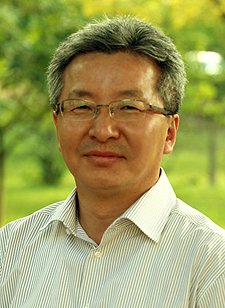Professor Choi, In-ho succeeds in cultivating cell strain for producing vaccines for foot and mouth disease
[October 4, 2011]
- * World’s first customized serum research considering ‘gender specifics’
- * Korean Intellectual Property Office recognized business profitability, applied for domestic and international patents
- * Domestic serum market that depended entirely on imports, expected to substitute imports worth 20 billion won per year
The cost of damages in Korea caused by foot and mouth disease last winter amounts to about two trillion won. Also, it is estimated that 40 billion won in importing foot and mouth disease vaccines needed twice for inoculating the 13 million cows and pigs grown in Korea will be needed. However, the appearance of livestock farms with foot and mouth disease outdoor virus (NSP) antibodies without receiving vaccines were recently reported nationwide. Therefore, there are many concerns over the recurrence of foot and mouth disease.
At such point, a professor in a Korean university published research results that opened the doors to possible localization and mass production of serum needed in producing animal vaccines.

This was done by Professor Choi, In-ho (47, president of the Bovine Genome Resources Bank, photo) of the Yeungnam University School of Biotechnology. After years of research, he succeeded in cultivating cell strains for developing foot and mouth disease vaccines using serum extracted from the blood of Hanwoo cattle. By reusing the 15,000 tons worth of blood that were thrown away for the most part from the 600,000 Hanwoo cattle in Korea as of 2010, it can substitute 20 billion won worth of imports for the domestic serum market that was entirely dependent upon imports. Furthermore, it can also minimize risks of the blood that contains a high amount of gender hormones being thrown away without proper precautions to act as environmental hormones that disrupt the natural ecology.
In particular, the research of Professor Choi is noteworthy in the fact that it is research on customized cow serum production that is ‘gender specific’. While other cow serum were extracted and processed without giving consideration to the gender, Professor Choi became the world first to conduct research on gender (female, male, neutered) specific cow serum with funding by the Rural Development Administration based on the fact that due to the different constituents and hormones in the blood depending on the gender of the animal, there could be different effects on cell cultivation.
In result, he found that for the cell strain (BHK-21) that is normally used for producing foot and mouth disease vaccine, grows better in the serum from adult Hanwoo cattle than the imported fetal bovine serum. He also discovered that it grows better in male serum than female serum. This suggests that the development of gender specific serum (also called ‘customized serum’) of optimal cultivation for different virus or cells is possible.
The research results of Professor Choi’s gender specific cow serum production already acquired patents in Korea and it is also undergoing the application process for international patents. In addition, it was also selected as a ‘Lab Patent Strategic Project’ funded by the Korean Intellectual Property Office and was diagnosed as ‘very high possibility for industrialization’, and was revealed to have the potential to help in the development of vaccines for foot and mouth disease in Korea.
“Vaccines use inactive or weak viruses, or parts of viruses, and inject them in animals and people to have the immune system respond to the virus. Therefore, it is possible for the body to resist the particular virus when it infiltrates the body later. Ultimately, the key point for developing vaccines is the mass production technologies of viruses that can be used as vaccines. For this, a certain amount of nutrition is needed. Currently, the serum of cows is used the most throughout the world and the global market is worth two trillion won per year. Of this, 85% is being produced in the US. Thus, in events like the mad cow disease outbreak in 2008 in North America, sudden shortages of supplies can occur at any time, and procuring a sufficient amount of cow serum is a key requisite for the localization of vaccines.

Due to this, Professor Choi became interested in producing cow serum in Korea since 2008. He conducted preliminary tests for two years with the funding of the National Research Foundation of Korea and confirmed the potentials by providing other researchers with the Hanwoo cattle serum that were produced. And since 2010, he received funding for research expenses by the Rural Development Administration to conduct full-fledged research on the industrialization of Hanwoo cattle serum, and finally opened the doors to the industrialization of livestock blood, which thus far were simply environmental wastes.
Professor Choi said, “In the event that gender specific serum becomes industrialized, it will be possible to produce them at affordable costs for imported cow fetus serum, and thus take a financial load off on farms. In addition, it will be possible to procure safety that can protect us from various diseases that may possibly occur in the future.” He added, “Of course, there will be many obstacles to overcome such as modernizing slaughterhouse facilities to produce clean serum with consistent quality and changing the cattle raising system of some farms so that they are suitable for producing serum to be used to make vaccines. However, if interest and research on producing the serum is made, Korea will also be able to produce vaccines of international standards in the near future.”
Accordingly, Professor Choi will hold a symposium on ‘Hanwoo Cattle Serum Research and Industrialization Plan for Producing Vaccines’ at Yeungnam University, sponsored by the Bovine Genome Resources Bank on October 7 (Friday), to examine the recent research trends of the biotechnology sector, while looking for possibilities of industrialization.











